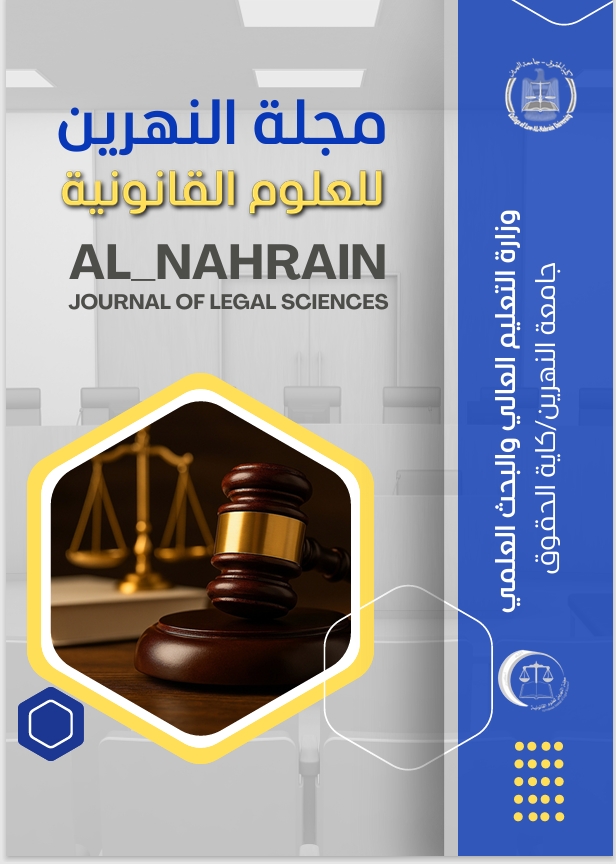Abstract
This study is concerned with researching one of the applications of artificial intelligence represented by the idea of predictive judiciary (justice) and the multiple uses that can result from it, some of which are specifically for the administrative judge himself, who has been called the smart judge, and others are carried out by individuals, lawyers and some companies that have entered the field of creating algorithmic programs and applications that can give preliminary (predictive) results about the case before the administrative judge. We have noticed that what encouraged and accelerated the entry of artificial intelligence applications into the field of administrative judiciary is the tendency of most countries to make judicial rulings data available and publish them electronically and free of charge to individuals and under various names, including what is called in France (digitization of the republic). This study attempted to identify the meaning of predictive judiciary (justice) and the position of Jurisprudence and judiciary from them and the possibility of using them and reviewing the most important advantages provided by the idea of predictive justice and the fears and defects surrounding its application. This study also showed the degree of relationship between using the idea of predictive justice and announcing the names of judges issuing judicial rulings and decisions and mentioning them in the text of the judicial ruling and the penalty resulting from ignoring this formality, and the extent of its conflict with preserving their security and the security of their family members on the one hand and the extent of its impact on their private lives and what they can enjoy of privacy. Finally, this study showed the position of the French and Iraqi legislators on the extent of the legitimacy of individuals using the names and identities of judges and circulating them through the judicial rulings issued by them and exploiting them for the purpose of analyzing and evaluating their judicial precedents, reaching the point of predicting the outcome of the lawsuits brought before them and presenting them to individuals for a financial consideration and with the aim of profiting from them. The position of the French legislator in this area was clear through criminalizing these actions and stipulating the punishment of their perpetrators.
Abstract
تهتم هذه الدراسة بالبحث في احدى تطبيقات الذكاء الاصطناعي المتمثلة بفكرة القضاء(العدالة) التنبئي وما يمكن ان يسفر عنها من استخدامات متعددة بعضها خاصة بالقاضي الاداري ذاته وفق ما اصطلح على تسميته بالقاضي الذكي ، والبعض الاخر يقوم بها الافراد والمحامين وبعض الشركات التي دخلت حيز انشاء برامج وتطبيقات خوارزمية من شانها اعطاء نتائج مسبقة (تنبئية) عن الدعوى المنظورة امام القاضي الاداري ، ولقد شجع وسرّعَ على دخول تطبيقات الذكاء الاصطناعي مجال القضاء الاداري هو توجه اغلب الدول الى اتاحة بيانات الاحكام القضائية ونشرها الكترونيا وبشكل مجاني للافراد وتحت مسميات متعددة منها ما اصطلح على تسميته في فرنسا بـ(رقمنة الجمهورية) ، وحاولت هذه الدراسة التعرف على معنى القضاء(العدالة) التنبئي وموقف الفقه والقضاء منهما وامكانية استخدامها واستعراض اهم المزايا التي تتيحها فكرة العدالة التنبئية والمخاوف والعيوب التي تكتنف تطبيقها ، كما بينت هذه الدراسة درجة العلاقة بين استخدام فكرة القضاء(العدالة ) التنبئي وبين اعلان اسماء القضاة مصّدري الاحكام والقرارات القضائية وذكرها في متن الحكم القضائي والجزاء المترتب على اغفال هذه الشكلية ، ومدى تعارضها مع الحفاظ على امنهم وامن افراد عوائلهم من جهة ومقدار مساسها بحياتهم الخاصة وما يمكن ان يتمتعون به من خصوصية من جهة اخرى ، واخير بينت هذه الدراسة موقف المشرع الفرنسي والعراقي من مدى مشروعية استخدام الافراد لأسماء القضاة وهوياتهم وتداولها من خلال الاحكام القضائية الصادرة عنهم واستغلالها لغرض تحليل وتقييم سوابقهم القضائية وصولاً الى التنبوء بنتيجة الدعاوى المعروضة امامهم وتقديمها للافراد بمقابل مالي وبهدف الربح منها ، ولقد كان موقف المشرع الفرنسي في هذا المجال واضحاً من خلال تجريم هذه الافعال والنص على معاقبة مرتكبيها
